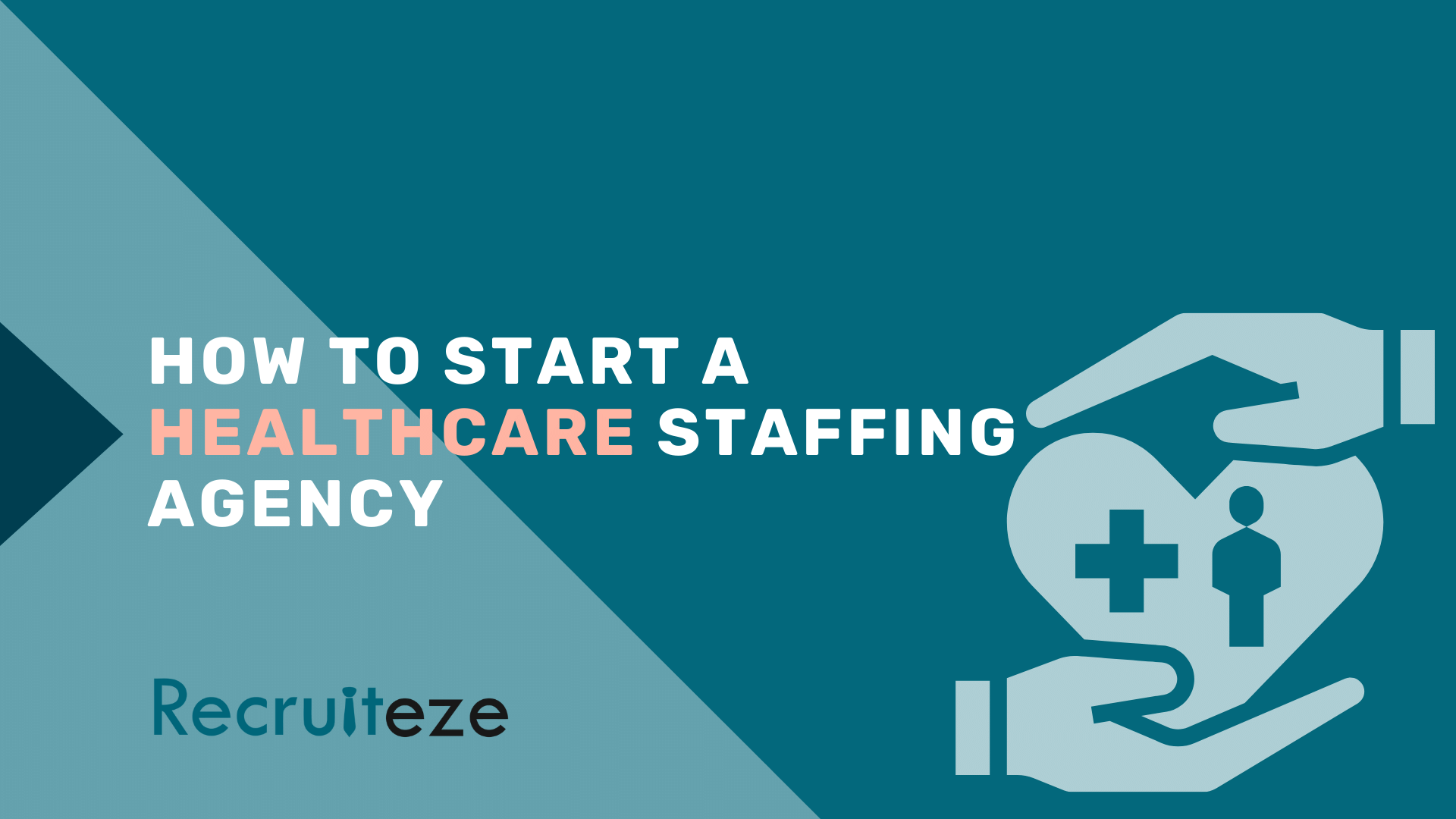
We have discussed starting a staffing agency in-depth in our previous post. In this one, we will talk about how to start a healthcare staffing agency.
However, since the basics are the same for starting every staffing agency, make sure to first read our post on How to Start a Staffing agency, in this post we will focus on specific challenges that apply only to healthcare staffing agencies.
Table of content:
- Responsibilities of a healthcare staffing agency
- Starting a healthcare staffing agency challenges
- High competition
- Retiring baby boomers
- Retention
- Increased need for healthcare workers
- Best Applicant Tracking System For Healthcare Staffing Companies
Responsibilities of a healthcare staffing agency

A staffing agency is responsible for placing a candidate with a business that is hiring. They may be placed on a temporary basis, part-time, full-time, or in a temporary position that leads to a permanent position.
This is a great company to start if you’re considering becoming a business owner. Below, you’ll find information that can help you start your own. All agencies need top-notch recruiting software to be successful.
- When working to start your own staffing company, it’s possible to get the business up and running within three months. The first step should be to get an employer identification number. The EIN will be obtained from the IRS. It will be your company’s identification when it comes to paying taxes. It also comes into play when paying employees.
- Once you’ve obtained your EIN, you may consider contacting the local and state government to find out more information about licensing, certificates, and registration that might be needed to start and run your staffing agency.
- There are certain industries that require various certificates and licensing. It’s best to consult with the government to make sure you are adhering to guidelines and regulations. Starting off on the right foot by being compliant is essential for your company‘s success and growth.
- Next, inquire about insurance for your business. Also, do research on whether or not your business and employees should be bonded.
- Startup costs for a staffing agency are often minimal. However, it’s important to make a budget that includes costs for registering your business’s name, incorporation fees, registration costs, advertising, office equipment, a place to house your business, and a reasonable salary for yourself. If you plan to have employees, you’ll also need to factor in their wages.
- A small downside of opening a staffing agency is that it’s possible that your clients may not pay you for 30 to 90 days, depending on your contract with them. Having an operating budget will help you determine exactly how much money you’ll need to keep your business afloat before revenue starts coming in.
- Once you have some of the budgeting aspects in order, it’s time to consider whether or not you’ll be hiring employees and, if so, how many. Some staffing agencies only need two to three employees during business hours. However, starting out, you might only be able to budget for one or two, depending on your startup costs and available money.

This information can help you get your staffing agency up and running within three months! We wish you luck and hope your business is successful. If you need help with the daily tasks of operation, take a look at our ATS! To learn more, be sure to check back with our next blog post. There you’ll find more info on opening your own staffing agency.
Healthcare recruiting is proving to be one of the most challenging industries to date for various reasons. Whether it be constant advancements in technology, retiring employees or retention issues, the fact remains that finding top talent in this industry isn’t always easy.
Below, you’ll find several of the most challenging issues recruiters face when seeking out new employees for healthcare openings. Did you know that reducing hiring challenges is as easy as using our free online recruiting software? Start using Recruiteze today and work smarter, easier, and faster!
Starting a Healthcare Staffing Agency Challenges

High Competition
The economy seems to be getting better every day. However, many are still without work. Some companies can’t afford new employees and they are worried about hiring too many, in case there is another recession. While there’s no labor shortage, many recruiters are reporting that they’re having trouble finding top talent in their industry. Healthcare is one of those sectors. The shortage of candidates is the biggest challenge in Healthcare IT.
In 2014 a survey done by the Health Information Management and Systems Society suggested that technology is moving more rapidly than people can keep up with, especially in the healthcare industry. Things like Electronic Health Records (EHR) are causing this problem. Those who graduate with an IT degree aren’t usually qualified to work in healthcare because of the ever-changing technology. They’re not able to teach the latest advances because they are constantly changing.
Because of this challenge, there aren’t many potential candidates. This means the competition between recruiters is very high.
Retiring Baby Boomers

Believe it or not, the healthcare industry is made up of 2.5 million baby boomers! That means that as this generation starts to retire, there will be a devastating blow to this sector. The domination of Gen X is causing concern in terms of how volatile the sector will become when the baby boomers begin to retire in masses. The stability of healthcare lies within these workers. We can’t expect them to hang around and work forever, but when the time comes – and it’s already starting to happen – the future of healthcare in terms of recruiting will be forever changed.
Shortages of nurses and physicians in this field will be the biggest impact. This generation makes up 28 percent of the population. As they retire, they’ll no longer work within healthcare but also need to rely on healthcare. This alone will cause a surge in the need for more services.
The goal at this point for many recruiters is to persuade current baby boomers to stay on the job as long as possible before retiring. As it stands, one in ten Gen X workers say they’ll never retire. Let’s hope for now that it’s true. The more that continue working, the better the industry will be for now.
Retention

David L. Longworth, M.D., chair of the Medicine Institute at Cleveland Clinic, part of the nonprofit multispecialty academic medical center specializing in studies that approach improving patient-centered care. “Healthcare reform is forcing hospitals to reconsider how to deliver value-based care. It also causes hospitals to consider new roles like care coordinators and clinical pharmacists who can focus on the management of medically complex patients.”
The Affordable Care Act that went into effect in 2014 left hospitals, providers, and healthcare systems with problems retaining current employees. More than 30 million Americans were newly insured. This left a need to increase retention. Why? Employees need a valid reason for staying on. Creating a place that not only removes barriers but also promotes long-term satisfaction is key.
Increased Need for Healthcare

Free Online Recruiting Softwares we mentioned above, baby boomers are beginning to retire. That means they’re also at an age when health problems come into play. The need for healthcare is going to increase tenfold in the next 10 years. That means these unique issues will not only affect the industry but also recruiters of this sector. There will be a need not only to replace those that retire but also to add more employees to make up for the increased need for services.
Did you find this information helpful? Are you a recruiter in the healthcare industry? It’s a challenging industry that offers great rewards. What are the challenges you face? If you need assistance with your hiring efforts consider using our recruiting software – Recruiteze or iReformat. Our recruiting solutions can help with everyday tasks as well as organization and reformatting of resumes.
To learn more about healthcare recruiting, be sure to visit back with our previous blog post. We offer a few tips for those searching for talent in this industry.
Best Applicant Tracking System For Healthcare Staffing Companies
Our free applicant tracking system for staffing companies is an amazing system that can help you become more effective, productive, and streamlined, without having to worry about the day-to-day hassle of keeping track on a never-ending spreadsheet.
Recruiteze will help you get your job ads published on important job sites like Google, LinkedIn, ZipRecruiter, and more. Don’t take the time to post your job ad multiple times when you can trust Recruiteze to do it for you! Many times, small businesses will hire staffing agencies to help them with the ins and outs of recruiting tasks. However, with an ATS like ours, you can save time, effort, and money by allowing our system to help!
In addition, you’ll be able to send out personalized emails to each candidate to help save time and effort. Communication with applicants won’t fall to the side and you’ll be gaining a great way to keep the applicant engaged and informed.
